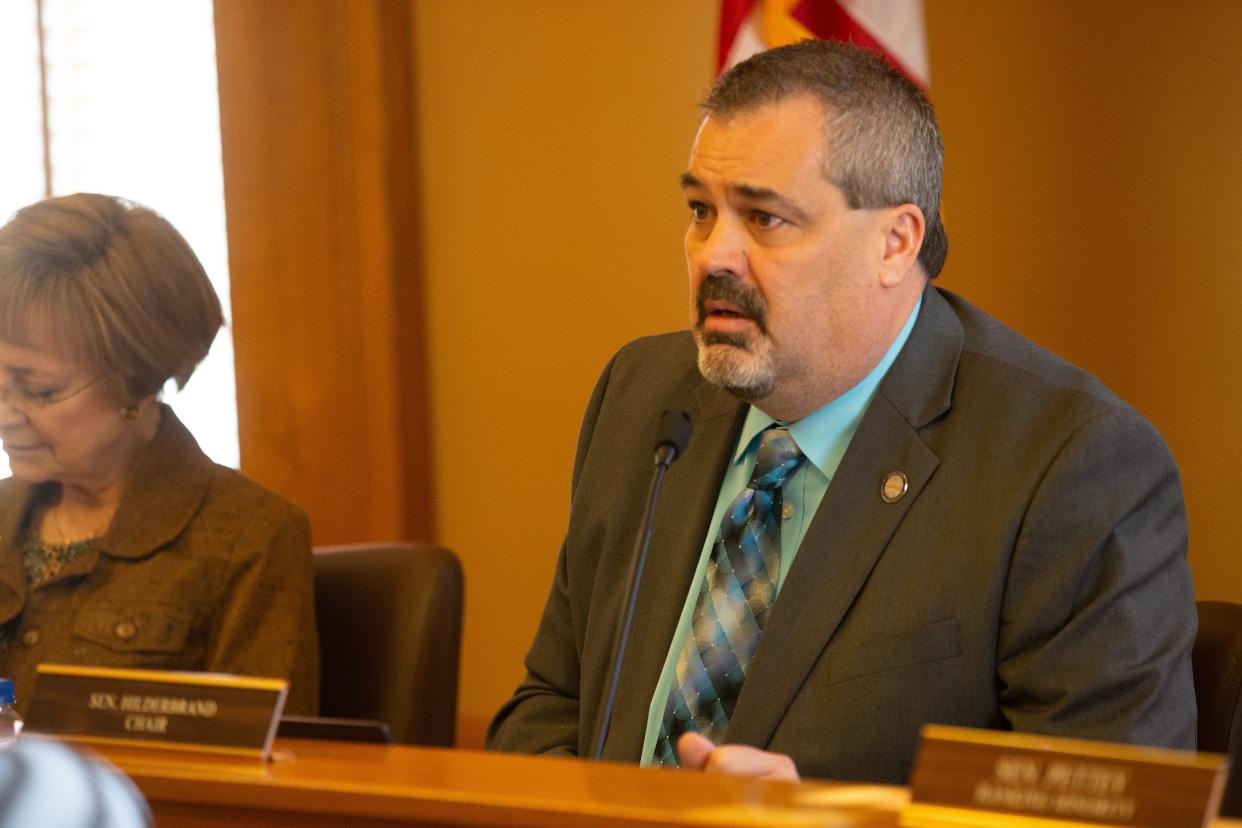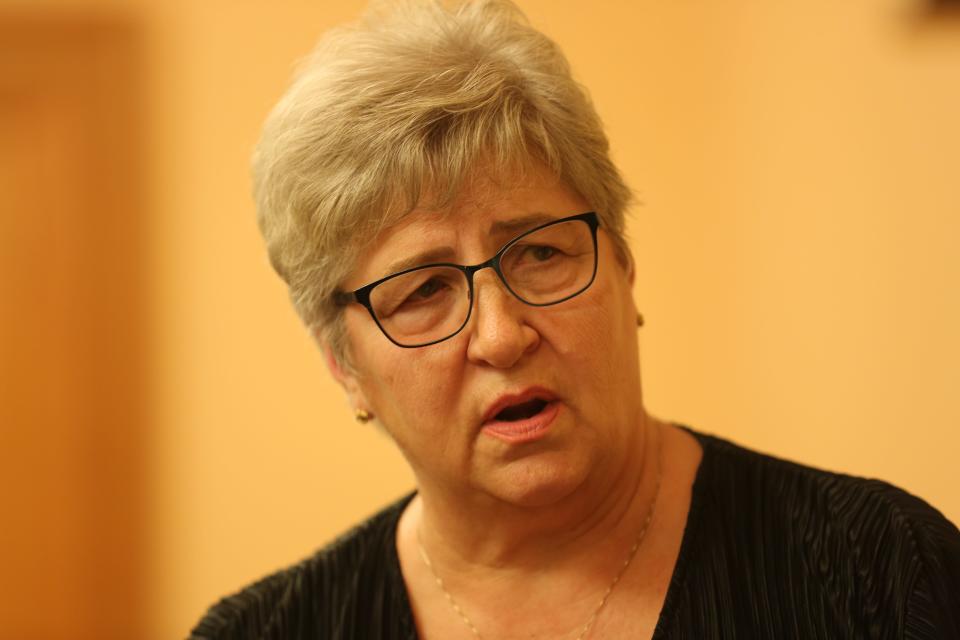COVID-inspired rewrite of public health laws passes Kansas Legislature, despite tuberculosis outbreak concern

The Kansas House voted late Thursday night, and the Senate Friday morning, to advance a major rewrite of the state's public health laws, largely inspired by the coronavirus, despite concerns from members of both parties that its provisions went too far.
The bill was pieced together just hours earlier after weeks of efforts, led by the Kansas Senate, to advance a legislative response to government actions during the COVID-19 pandemic.
The new legislation primarily targets mask mandates and quarantine orders. It also has a watered-down anti-vaccine provision. There is no provision on ivermectin and hydroxychloroquine as off-label drugs.
Rep. Brenda Landwehr, R-Wichita, chair of the House Health and Human Services Committee, told her colleagues during a House GOP caucus meeting that she acquiesced on the bill in order to advance other legislation.
"We don't have the answers we should have standing before you tonight," she said.
A bill to support the 988 suicide prevention hotline was approved at the same committee meeting as the public health bill. Some lawmakers had previously expressed concern that senators would block the funding without movement on COVID-related legislation.
There are also rumblings the fate of other legislation — including the fate of a plan to legalize sports betting in Kansas — could also be tied to the public health bill, SB 34. It passed the House 64-53, one more aye than needed. It passed the Senate 23-17.
More: 'Bring back measles.' Kansas legislators debate slew of COVID-inspired attacks on public health laws
Of particular concern to some lawmakers was that the bill largely applies to all infectious diseases, not just COVID-19. A recent tuberculosis outbreak in Wyandotte County drove that point home.

"There's a little bit of concern of what happens with different breakouts," Landwehr said during negotiations. "We just had a TB breakout. And if you've never dealt with TB, that's pretty ugly. So this would not protect other individuals."
The KDHE reported the tuberculosis outbreak on March 30, which at the time had fewer than 10 cases.
A KDHE spokesperson said this week that screening and testing of contacts shows the outbreak has grown within households that were already affected. The disease has not otherwise spread outside those families. All patients are responding well to treatment.
More: Kansas has a new health secretary as lawmakers seek to take away her public health powers
Legislation restricts government mask mandates
No governmental body or public official could mandate face masks to prevent the spread of any infectious disease.
An exception would be made for certain health care workers. The government could require hospital surgeons to wear masks when treating patients, for example, nursing homes would not receive similar treatment.
"That's all infectious diseases," said Rep. John Eplee, R-Atchison. "All respiratory infectious disease, including tuberculosis, including streptococcus, including pneumococcus. You can't require people to wear a face mask in certain situations, from a government entity standpoint, for the wide array of respiratory-acquired illness."
On the House floor, members worried the Kansas Department of Corrections could not require masks in their prisons during an outbreak and others were concerned it could apply even to healthcare or biomedical facilities.
"I hate masks personally but in some events they need to be used," Rep. Chuck Smith, R-Pittsburg, said.
Others played down the potential pitfalls and harkened back to the early days of the COVID-19 pandemic, saying something was needed to avoid a repeat of government-induced shutdowns and requirements.
"When government starts infringing on individual rights, no matter how good the cause, no matter how good the reason, we are all diminished," Rep. Pat Proctor, R-Fort Leavenworth, said.
Animal health and zoonotic disease
Sen. Mary Ware, D-Wichita, warned of zoonotic diseases spreading to humans and an inability of public health officials to adequately respond.
Sen. Dan Kerschen, R-Garden Plain, relayed a question that he said came from the animal health commissioner. Amid the ongoing avian flu outbreaks, the staff are required to wear masks and other PPE when investigating the flocks. He interpreted the bill to now put the animal health department in violation of the mask mandate ban.
"If this bill passes, if someone mandates that they have to wear a face mask, then that would be a violation if it's a government entity or public official," Hilderbrand said.
"In a situation like that, I don't see the employee wanting to refuse to wear a mask," said Sen. Mark Steffen, R-Hutchinson.
Kansas has had bird flu detected in six flocks in the past two months, which then were quarantined and the birds killed. USDA reporting shows outbreaks remain active.
It is rare that bird flu spreads to humans. Colorado officials confirmed the first human case in the U.S. of the H5N1 avian flu on Thursday.
More: As bird flu outbreaks hit the Midwest, Kansans could see economic cost in higher meat, egg prices
Sen. Pat Pettey, D-Kansas City, pressed Hilderbrand on barring mask mandates for all infectious diseases, listing off measles, mumps, rubella and others.
"Until COVID-19, at least as long as I can remember, all those have been around, and COVID-19 was the first time that we had mandatory mask mandates and the likes," Hilderbrand said. "So not sure that would change anything."
"This is a tool that should be available for our elected officials, health officials in our communities to use," Pettey said.
Sen. Kellie Warren, R-Leawood, said the measures are to protect against government overreach in any future pandemic
"Kansans have asked that we put guidelines in place that this doesn't occur again," she said.
Proposal bans COVID-19 vaccine passports
Governments would be barred from requiring a COVID-19 vaccine passport or discriminating based on vaccination status. Medical facilities would again have an exception.
Another vaccine provision creates a requirement that when the KDHE adds a vaccine to the list of inoculations required to attend school, the vaccine must be FDA-approved. No such requirement currently exists, though all childhood wellness vaccines do have FDA approval.
The provision is targeted at the COVID-19 vaccines, which have full FDA approval for adult use, but remain under emergency use authorization in younger children. State health officials and the governor have publicly said they have no intention of requiring COVID-19 vaccines for schoolchildren.
The bill does not contain language expanding the existing religious exemption to include moral and ethical beliefs, as religious conservatives had pushed for. Such a proposal would also bar schools from questioning the sincerity of the religious belief.
More: 'I'm just seeking the truth': Senator on Kansas anti-mandate panel questions COVID vaccine safety
Health officers to be limited in quarantine abilities
One provision would remove statutory authority for health officials to order law enforcement to help enforce a quarantine order. A separate agricultural statute allowing similar orders for livestock quarantines is unaffected.
"I'm really concerned about the whole thing about restricting the powers of the secretary of health and environment," said Rep. Susan Ruiz, D-Shawnee, during negotiations. "Having to order law enforcement to assist ... does this mean that if we have an outbreak of TB, that the secretary cannot enforce anything else with that for the quarantines or the isolation, inoculation and vaccines that might be needed?"
"What kind of discussion was made with physicians regarding this, and with the secretary of health?" Ruiz asked.
"Zero," Hilderbrand replied.
While no evidence has been presented that health officials orders law enforcement to assist with quarantines during the pandemic, Hilderbrand said law enforcement had requested the change because they "do not want to be in that position."
"Look what's happening in Shanghai," he said. "I do not think our state of Kansas should have the ability to do the same thing that's happening to those poor people in Shanghai, and this would do that."
"I'm somewhat offended to be compared to Shanghai because what has been going on in China has been totally different than what's been going on in Kansas in the last two years," Pettey said.
More: Kansas Republicans on mission to fulfill COVID special session promise with stronger legislation
No ivermectin and hydroxychloroquine provision included
Hilderbrand and Republican senators have pushed for a bill expanding childhood vaccine exemptions and greater authority for off-label prescriptions for COVID-19, but House negotiators repeatedly rejected the legislation.
The off-label prescribing of ivermectin and hydroxychloroquine has been a high-profile priority of many conservative lawmakers, most notably Steffen. Reputable studies and show the off-label drugs have no medical benefit in treating or preventing COVID-19.
Steffen, an anesthesiologist, has admitted to prescribing ivermectin and has said he is under investigation by the board of healing arts. The bill championed by Steffen would protect doctors from being disciplined by the licensing board in connection to the pandemic while also forcing pharmacists to fill the prescriptions.
Jason Tidd is a statehouse reporter for the Topeka Capital-Journal. He can be reached by email at jtidd@gannett.com. Follow him on Twitter @Jason_Tidd.
This article originally appeared on Topeka Capital-Journal: Kansas public health bill targets mask mandates, quarantines, vaccines

